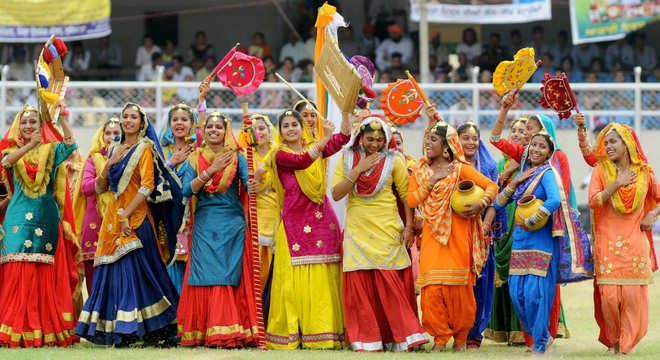Log boliyan bole...Punjabi folk dons new form to take on social ills
Gurvinder Singh
Tribune News Service
Ludhiana, August 21
That culture can turn into a vehicle to address social challenges and bring about a positive change has come to fore in a special form of giddha performed by girls. This giddha is based on special ‘bolian’ and has messages directed at social evils that need our attention.
Dressed in Punjabi folk attire, holding pakhis, chhajs and ghadolis, the girls were all smiles performing this form of giddha. While the girls enjoyed performing, Surachna Pandher, a teacher at Government Senior Secondary School, Khanpur and Amarjit Kaur, a teacher at Malwa Khalsa School, who have scripted the bolis, said these have an edifying influence on the listeners as along with social ills, they also address problems like stubble burning, gender equality and water conservation.
A similar giddha performance was given by the girls during the recent Independence Day celebrations at Guru Nanak Stadium. Several such bolis had a folk blueprint — beginning with verses in a traditional manner, but having a ‘social twist’, interspersed with messages of challenges that contemporary society faces, giving the folk form a new social relevance.
One such performance said, “Ohda aar koi na, ohda paar koi na, jehra rishvat khave, oda hal koi na.” It was a reminder of the consequences that can befall one if caught taking bribe.
Another boli envisaged a society in which nobody takes bribe or consumes alcohol. “Na kise ne rishvat khani, na koi peeve daru, ral mil ke asi soh khayiye, sohna desh banayiye.”
One of the messages expressed concern over water shortage and the need to save water. “Dar lagda ae, pae na jaye soka kudiyo, aao pani bachayiye, ehi mauka kudiyon.”
The threat of drug abuse that looms large in Punjab also surfaced several times. “Karo nasheyan to toba”, exhorting all to say no to drugs. Another boli pleaded for eliminating drugs from society, “Boli payiye lalkaar ke, nasheyan nu kadh deyiye, dhakke mar mar ke.”
Respect for women was another theme, “Os pind nayio jaana jithe dhiyan di kadar na koi,” meaning do not go to a village where there is no respect for daughters.
Yet another pleaded for gender equality, “Kudiyan na kise ton ghat ji, lakhan gun kudiyan de...ehnu deo barabri de haq, bai lakhan gun kudiyan de.”
Another performance had the message of afforestation, projecting it as good deed, “Boote layiye, punn kamayiye”.










